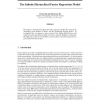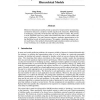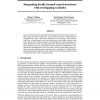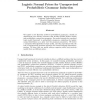NIPS
2008
14 years 29 days ago
2008
We propose a nonparametric Bayesian factor regression model that accounts for uncertainty in the number of factors, and the relationship between factors. To accomplish this, we pr...
NIPS
2008
14 years 29 days ago
2008
Unexpected stimuli are a challenge to any machine learning algorithm. Here we identify distinct types of unexpected events, focusing on 'incongruent events' when 'g...
NIPS
2008
14 years 29 days ago
2008
Multi-level hierarchical models provide an attractive framework for incorporating correlations induced in a response variable organized in a hierarchy. Model fitting is challengin...
NIPS
2008
14 years 29 days ago
2008
In many domains, data are distributed among datasets that share only some variables; other recorded variables may occur in only one dataset. While there are asymptotically correct...
NIPS
2008
14 years 29 days ago
2008
Given an n-vertex weighted tree with structural diameter S and a subset of m vertices, we present a technique to compute a corresponding m
NIPS
2008
14 years 29 days ago
2008
The discovery of causal relationships between a set of observed variables is a fundamental problem in science. For continuous-valued data linear acyclic causal models with additiv...
NIPS
2008
14 years 29 days ago
2008
We explore a new Bayesian model for probabilistic grammars, a family of distributions over discrete structures that includes hidden Markov models and probabilistic context-free gr...
NIPS
2008
14 years 29 days ago
2008
Kernel Principal Component Analysis (KPCA) is a popular generalization of linear PCA that allows non-linear feature extraction. In KPCA, data in the input space is mapped to highe...
NIPS
2008
14 years 29 days ago
2008
Motivated by applications like elections, web-page ranking, revenue maximization etc., we consider the question of inferring popular rankings using constrained data. More specific...
NIPS
2008
14 years 29 days ago
2008
In this theoretical contribution we provide mathematical proof that two of the most important classes of network learning - correlation-based differential Hebbian learning and rew...




